Every successful business needs a strong customer base. A customer base is a group of loyal and engaged customers that continuously purchase from your brand. Loyal customers are the key to rapid business growth, and building and growing a customer base achieves this.
The chance of selling to a loyal customer is 60 to 70%. And these buyers are likely to recommend your business to about 11 different people!
Without building a reliable customer base for your business, you’ll miss out on these opportunities for higher conversions and ultimate brand awareness.
But developing a customer base isn’t a walk in the park. It takes a lot of time and effort to build. However, once you’ve established this group of loyal and interested buyers, you can nurture them and rely on consistent conversions and increased purchases.
So, how do you build a customer base? Which buyers would be considered part of this group of customers? And how do you use your customer base to drive insane conversions?
We’ve done our research and created a detailed guide on what a customer base is, how it works, the different types of customer base, and how to use this group of customers for powerful results!
Ready to build a solid customer base and scale your brand?
Let’s go!
A customer base is a group of loyal customers that repeatedly purchase from your business. The more you engage and nurture your customers to loyalty determines how strong your customer base is. And, of course, the stronger this group of customers is, the better, as these buyers are your most valuable financial resource.
You can consider this group of customers as your target audience. As these consumers are loyal to your brand, it’s fair to say your offerings match their needs. Brands can leverage powerful insights to shape their marketing strategies because of the available data from their customer base.
A simple customer base example is Nike. Nike has a large group of dedicated customers across the globe. Their consumers may purchase from other shoe brands but ultimately continue to engage with and support this one brand.
There are many ways brands have developed a customer base, such as:
Establishing a customer base is essential if you want to scale your business. I’ll give you the top reasons to support this.
Summary: What is a Customer Base?
A customer base is a group of loyal and engaged consumers that repeatedly purchase products from your business. You can consider your customer base as your target audience. Because these buyers return to your business, you’re clearly offering them solutions for their needs and wants.
Source: Marketing 360
Businesses need a customer base to boost their communities, establish loyal buyers, take advantage of valuable insights and achieve sustainable growth.
Let’s take a closer look at the importance of a customer base and how it can stimulate your business:
A strong customer base can boost your consumer community. Consumers want to feel a part of something bigger, and that’s why having a community is vital. However, it’s not easy to establish an engaged community without having a customer base and vice versa.
Your customer base will organically become your community. And because these consumers love your business and offerings, they’ll make an effort to interact with other buyers in your community. If some buyers in your customer base aren’t already community members, they’ll have more reason to join!
If you’ve ever launched a customer loyalty program, you’ll know two things. 1)Loyal customers are the secret to success, and 2)Attracting, engaging, and retaining loyal customers is a tricky process.
But with a customer base, you already have a segment of loyal consumers. And with the help of loyal buyers, brands can use user-generated content and boost their online reputation.
You can also nurture your loyal customers to become brand advocates. If there’s any creators or influencers in your customer base, you can also take advantage of this through influencer marketing.
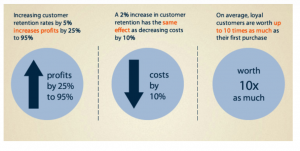
Because your customer base consists of loyal and engaged buyers, you’re most likely providing precisely what these consumers want. Businesses must use data from their customer base to refine their products and marketing angles.
In other words, you have a vast collection of buyer data to use to your advantage. Testing marketing strategies is also simpler with a group of engaged customers because you can quickly see what engages your target buyers.
As your customer base grows, you’ll have more data to use. In turn, businesses can consistently deploy growth hacking strategies while closely considering their consumers.
Ultimately, because of the three benefits we discussed above, your customer base offers sustainable business growth. A thriving customer base leads to increased loyal buyers. And loyal buyers welcome growth opportunities through word-of-mouth marketing, influencer marketing, and user-generated content.
We all know loyal customers are much cheaper than constantly acquiring new buyers. So with a customer base, you can use your resources to scale your business through loyal customers instead of always hunting for quality leads.
Summary: The Importance of a Customer Base
A customer base is vital so you can:
If you know anything about customer segmentation, you’ll know that your customer base won’t only contain one specific buyer persona. Various customer segments make up a brand’s customer base, depending on what motivates them to return to your business.
Here are three common types of customer base:
Need-based customers are buyers that engage with your business for specific products they need. These consumers aren’t likely to spend money on product upselling, as they depend on your business for certain items.
A significant downfall with need-based buyers is they can easily switch brands. Need-based customers will do this when:
To retain need-based buyers, use much more personal interactions with these consumers. Brands must use loyalty marketing to keep these consumers connected to their brand.
The best way to retain need-based buyers is to:
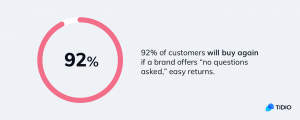
As need-based buyers are less privy to product upsells, it doesn’t mean you shouldn’t persuade them to spend more money. Instead, use the tips we’ve outlined above to develop need-based customers into loyal consumers.
Loyal consumers are the core segment of a thriving group of dedicated customers. These buyers tend to go beyond need-based buyers and purchase various products based on their needs and wants.
Loyal buyers will spread the word about your business and keep engaged with your brand. They will also act as your primary source of revenue, so keep them happy.
A common mistake many businesses make is developing loyal buyers without continuously nurturing them. Loyal buyers must be your first concern to grow your business through your customer base.
To maintain loyal buyers in your customer base, follow these tips:
Discount customers, as the name applies, are customers that support your business during discounts and sales These buyers are typically interested in your products but can’t afford or conveniently use them.
Like need-based buyers, discount customers are more prone to leave your business on the hunt for discounts. But this doesn’t mean they aren’t essential. These shoppers help turnover your inventory and, as a result, maximize your bottom line.
Don’t expect to accomplish successful upselling with discount buyers either. These customers want to spend less money on valuable products, so upselling is in a completely different direction.
To engage and convert discount buyers, brands must:
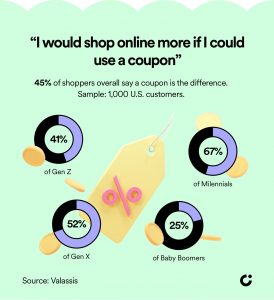
Summary: 3 Types of Customer Base
Fantastic customer service is what every buyer expects. 90% of US shoppers consider customer service when deciding whether to purchase from a brand. And 60% of customers report that fantastic customer support helps them develop brand loyalty. But you need to go beyond standard customer service. Exceed your customers’ expectations to maintain and grow a profitable customer base.
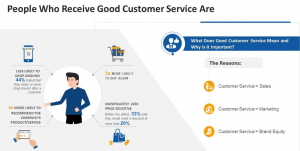
You can exceed your buyer’s expectations through methods like:
By all means, avoid the “one-size fits all” approach. 72% of buyers respond to marketing communication personalized to their choices. And almost 100% of marketers noticed an increase in positive business outcomes because of personalization.
You want your customers to feel valued by your brand. So ensure you personalize your strategies and communication efforts to the respective buyers.
The best way to achieve this is by segmenting your buyers based on the types of customer base we looked at before. Once you’ve segmented your customers, you can use personalized marketing strategies like upsells, email newsletters, and discounts to appeal to those buyers.
When a customer takes a specific action like purchasing from your brand, you could send a thank you email with their name. With this approach, you’re making every customer interaction more personal and less transactional. These group of customers are the lifeblood of your business, so they certainly deserve a personalized approach.
Keep your customers invested in your business by giving them surprises now and again. You don’t have to surprise your buyers with discounts or sales. While this would keep them interested, it’s not profitable. Businesses can surprise their buyers through random appreciation emails or social media shoutouts. Use the element of surprise to remind your customers that you acknowledge their impact on your business and care about them.
Surprising your customers makes your business come off less conversion-hungry too. Without directly convincing your buyers to convert, you’re giving them a reason to want to stay connected to your business.
Be active on social platforms your customers use to nurture engagement. Take notice of customers that comment, like, or share your content. You can start a conversation in your comments and thank them for sharing your content.
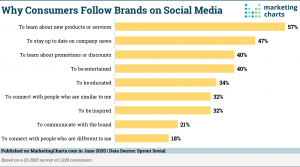
Online shoppers are using social media to influence their purchasing decisions. So, if your brand isn’t active on the same platforms as your customers, you’re losing out on loads of revenue. With active social media channels, you can build credibility and social proof for your brand. You’re creating another environment for customers to review your products and get the word out about your brand.
In addition, businesses that are active on social channels can create effective communication pipelines for their customers. A common frustration in dealing with brands is the inability to contact them conveniently. Over 60% of buyers say it’s challenging to switch between social channels when dealing with customer service.
So even if you are interacting with your customers on social media, ensure your customers can contact you through various methods seamlessly.
For example, if a customer sends you a query or complaint on Instagram, don’t respond with a phone number or suggest another form of communication. Make it possible to support your customers through social media. And if the problem escalates, you can advise another form of communication for efficient results.
Summary: 4 Ways to Use Your Customer Base and Scale Your Business
A strong customer base is essential for a successful business. This group of customers acts as your primary source of revenue, and in turn, you need to leverage how the powerful advantages these consumers provide. With a customer base, businesses can boost their community marketing efforts, secure customer loyalty, leverage valuable data and insights, and achieve sustainable business growth.
Within this group of engaged customers, you can segment your buyers into three main categories, need-based buyers, loyal customers, and discount consumers. Understand the various buyer segments within your customer base to accurately and successfully engage these consumers. To grow this group of consumers and achieve exponential growth, be active and consistent on social media, exceed customers’ expectations, personalize your marketing approach, and surprise consumers every once in a while.
A customer base is a group of loyal customers that repeatedly purchase from your business. These customers are engaged by your brand, and act as your most valuable financial resource. You can also consider your customer base as your target audience, making it imperative to use the abundance of data your customer base provides. Read our article to find out what a customer base is, why every business needs to build a strong customer base and how to use one to it's full extent. The primary types of customer base include loyal customers, need-based buyers and discount consumers. You must understand these different types of customer base for a personalized and foolproof marketing approach. While loyal customers are the core of a customer base, the other buyer segments also play significant roles. This article provides all the details on how to retain and expand the different types of customer base, why you need a customer base and how to leverage it for business growth. Brands must use their customer base to power maximum growth. To accomplish this, exceed your buyer's expectations, surprise your customers every so often, personalize your marketing strategies and stay active and consistent on social platforms. Read this full article to find out what a customer base is, the different types of customer bases and why you need a strong customer base. Frequently Asked Questions
What is a customer base?
What are the different types of customer base?
How do businesses use a customer base?
Altfeld: Customer Loyalty By Jill Griffin
Business Wire: #WellActually, Americans Say Customer Service is Better Than Ever
Microsoft: Global State of Customer Service The transformation of customer service from 2015 to present day
Zendesk: Zendesk Customer Experience Trends Report 2020
Wunderkind: The SmarterHQ Offering is Now Wunderkind Audiences
Salesforce: 2020 Trends in Personalization